U.S. Sen. Ben Cardin leaves public office in January after 58 years — 20 years in the Maryland House of Delegates, 20 years in U.S. House and 18 years in the U.S. Senate. On Sept. 12, Len Lazarick of Maryland Reporter had a 38-minute face-to-face interview with him in his Capitol Hill office. Here is a lightly edited version of that conversation. A column based on this interview appears in the November issue of The Business Monthly serving Howard and Anne Arundel counties.
Len: What I know — because I had been trying to get on your schedule for a while — is that you haven’t slowed down.
Ben: There is one thing about the Senate, and it’s not just me, but everyone in the Senate. For every minute of the day, there are ten other requests that you turned down for that minute. I find that regrettable because I like every once in a while to be spontaneous. My staff knows that. I just leave [my desk] and I’ll go out to the front office and talk to people who happened to be there and who had no idea that they’d a chance to meet with me. Sometimes I’ll pick up the phone, see who’s calling the office. There’s no programming time for that.
So, no, there’s no slowing down. The Senate Foreign Relations Committee could take 500% of my time. Listening to community needs could take 500% of my time. I want to make sure I’m still there as their senator until January 3rd. I’m out in the field. I’m doing my foreign relations work. I’m fighting for funding for the Key bridge. We’re making a lot of progress on that and I’m really hopeful we’re going to get the Key bridge authorization done in the next couple of weeks. [Meaning 100% funding.] I’m really optimistic we can get that done in the next couple of weeks. [This was before the two massive hurricanes in Florida that drained disaster funding.]
This job, it’s so important you got to give it your all. No, there’s no slowing down. At all. Zero. Ask, Myrna. She still doesn’t see me for dinner.
This job, it’s so important you got to give it your all. No, there’s no slowing down. At all. Zero. Ask, Myrna. She still doesn’t see me for dinner.
Len: And then they’re the people that don’t want to leave [the Senate] too.
[Cardin temporarily filled the seat of Calif. Sen. Diane Feinstein on the Judiciary Committee so Democrats could confirm Biden appointments to judgeships. This is the second time he’s served as chair of Foreign Relations during the federal corruption trials of New Jersey Sen. Robert Menendez.]
Ben: Right. Look, I understand that. I see that around the world — people who have power don’t want to ever give it up. And I recognize that I’m not one of those individuals. I think there’s time for new people to come along.
What he’ll miss
Len: Have you thought about what you’re going to miss or.
Ben: I’m not going to miss interviews by you guys. [Laughs loudly.]
Len: I don’t think you’re going to miss the commute either. [Cardin lives in Pikesville outside of Baltimore.]
Ben: I really do enjoy every day. I can spend the day doing absolutely nothing and enjoying it. And I can spend a day where I get up at five o’clock in the morning and I’ll come home about 1 a.m. in the morning. And I have to remember when I’ve eaten a meal that day.
So, you know, every day is an adventure.
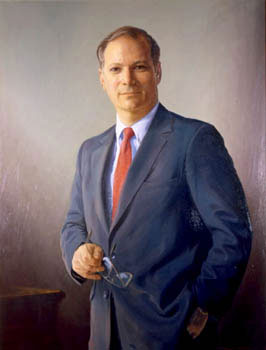
This portrait of a young Ben Cardin has hung in the House of Delegates chamber at the State House for decades. Maryland State Archives photo
Come January the 3rd at 12 noon, I’m going to be off for some new adventures. I think change is good in life. It was very difficult for me to give up being speaker of the Maryland General Assembly. It is a great job. As you know, there was no threat from me staying on as Speaker of the House. I could have stayed there comfortably and been very happy and very productive.
[In 2006.] there was no doubt I could win re-election to the House of Representatives, and I had a lot of seniority and leadership opportunities in the House of Representatives. The Senate race was not a guarantee, and I decided I would run for the Senate because I thought it was time to leave the House after 20 years and try something different.
I’m making this decision on my own. I’m not being told “It’s time for you to leave.” No one’s telling me that. But I know it is time and I’m making this decision because I think it’s the right decision for the people in Maryland.
For myself, I think back, I had to make an eight-year decision two years before the election. I think back how my life changed in those later years. So it’s the right decision.
What I’m going to do next? I am going to get a lot of opportunities. I’ve been told that already. I haven’t sought any, but yeah, there’s really a lot of opportunities. I’m going to think it over and I’m going to take some of those opportunities because I want to continue to be active as long as I’m able to. It is no longer a six-year commitment I’m going to have to make.
I’ll be able to make commitments to help pursue my passions in certain ways. They’ll be similar. It’s going to be on human rights, it’s going to be on civility. It’s going to be on trying to teach history to young people so that they understand where we’ve been in life.
I had a chance last night to talk to an international law group, and I sort of challenged them. We need people to understand that there is international law. We need to know the difference between autocratic regimes and democratic regimes. You see what the International Criminal Court is doing. They can’t distinguish between Israel and Hamas. You’ve got to be able to give a little bit of history to what’s going on in this world. I’m hoping I’ll be able play a role in that, particularly in history.
China
Cardin was surprised I wanted to talk about foreign policy, not realizing that I teach East Asian history after helping run several exchange programs with Chinese journalists. I’ve been to China five times, plus trips to Japan, Korea and Vietnam.
Ben: I’ve only been [to China] one time. And I have no desire to go back, tell you the truth. Sen. Schumer invited me to go on his recent trip. I couldn’t go. And it was a very productive trip. My trip was not productive at all. I met with all the Chinese officials, but it was all propaganda. No opportunity for input. There’s a change of attitude now. Now they are listening.
Sen. Schumer made a lot of progress when he was there. He really did. He moved the Chinese government’s policies. And part of it is good cop, bad cop, because the Biden administration has played such a bad cop role and for good reasons. So that when we come there and we talk about improving relations, the Chinese are happy about that.
Now, they are as rigid as you’re going to find any autocratic country — on Taiwan, on the Uighurs, on Tibet or on the China Sea. They’re not going to give one inch, but they’re transactional. They’re not suicidal.
So if we win in Ukraine — we have to win Ukraine — I think there’s a path forward with China as relates to the South China Sea and Taiwan. I don’t see a path forward with the Uighurs. The domestic issues I think are beyond salvage at this point.
On Taiwan, they’ll wait another 20 years. They were planning, if necessary, to use military force in the next 5 to 10 years. I think that’s where they are. But if Putin is perceived to be losing in Ukraine by the PRC — Putin will always say he hasn’t lost– But if Xi [Jinping, the Chinese president] interprets that as a loss, he’s going to look at what the United States is doing in the Asia-Pacific. The Philippines have just put in another military base. we’re working with Japan on all those threats.
I don’t think Xi is going to want to test us on this. And Congress is getting more and more militant in support of Taiwan. I don’t think Xi wants to see that military confrontation. I could be wrong.
I think we have to deal economically with China. We have a huge relationship with China economically. Next to the United States, China is basically the second largest economy in the world. Europe, it’s pretty close. But you’ve got to work with China, and we want to try to bring them in and control the rules according to market economies, not government-run economies.
Foreign policy
Len: Do you have a sense that your constituents have little idea how much you’ve dealt with foreign policy?
Ben: Let me put it this way: it’s rarely the first question they ask when they see me on the street. It’s not the headline issue. It’s not the issues that they see affecting their everyday life.
I have a very sophisticated constituency. There is a lot of international presence in the state of Maryland. We have a lot of the nonprofit groups that are located here. We have a lot of academic interest in international affairs. We have a lot of diaspora communities, and their activities related to foreign policy.
I hear from the Jewish community, the Philippine diaspora, African countries, the Italian diaspora, even Poland too. I get inquiries. I think most people in Maryland recognize I’ve been involved with international events with the Helsinki Commission and with the Foreign Relations Committee that I chair.
But it’s not what they have on their mind. So it’s not it’s not as important to them as getting prescription drug costs down or protecting the Chesapeake Bay or rebuilding the Francis Scott Key Bridge.
Netanyahu and Israel
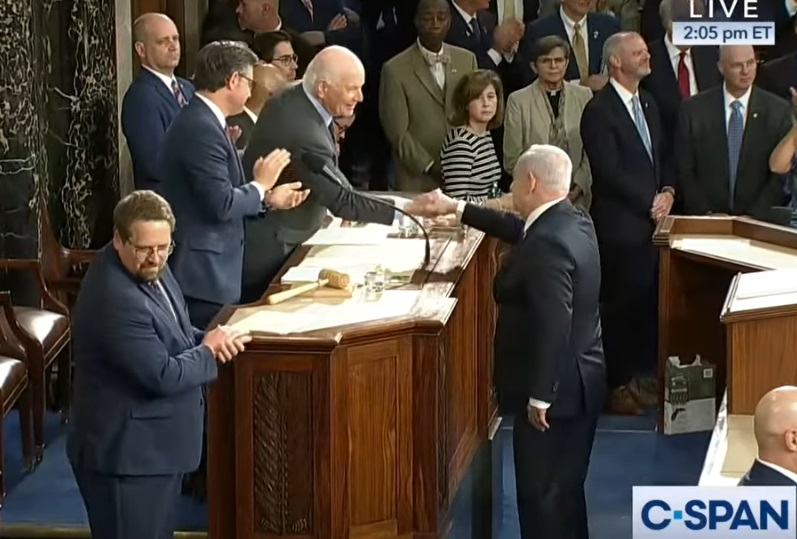
Maryland Sen. Ben Cardin, chair of the U.S. Senate Foreign Relations Committee, shakes the hand of Israeli Prime Minister Benjamin Netanyahu as he is about to address a joint session of Congress Thursday. Cardin served as temporary presiding officer of the Senate because Vice President Kamala Harris and Senate President-Pro Tem Patty Murray, D-Ore., did not attend the speech. Screen shot from C-SPAN.
Len: Did you get any pushback when you presided over the joint session of Congress with Israeli Prime Minister Netanyahu in July?
Ben: Not really. I have been told that I was the first chair of the Senate Foreign Relations Committee to have that position.
Len: You’ve known Netanyahu for a long time,
Ben: I’ve known him for a long time. We’ve met dozens of times — on a first name basis. I’ve known 17 different types of Netanyahus.
Len: How about this intransigent one?
Ben: I wish we could go back to some of his former ones. Leaders need to lead. The problem we have in Israel today is that the overwhelming position in Israel is similar to Netanyahu’s position in regard to Gaza. He’s not running into problems with popular support for his position in Gaza. But his position is not what Israel should be. It’s time for them to recognize that their security is not going to be on the battlefield with Gaza, with Hamas.
It’s going to be furthering regional security pacts that we saw in April when Iran tried to attack Israel, and we saw the help from other states to stop that attack from being effective. We already have the Abraham Accords, countries that have normalized their relationship with Israel. The Saudis are making it clear to everyone they want to normalize their relationship with Israel. That’s one of the reasons why October 7th took place. Iran wanted to block that. Hamas wanted to block that.
So to me, the prime minister’s failure is that he should recognize as a leader has to lead not by whether he can win the next election, but what’s in the best interests of his country. And right now, the best as this country is to try to normalize and isolate Iran and to get security pacts that protect against Iran as proxies. And in doing that, you have to have a solution for the Palestinians.
That solution does not necessarily rest with the Palestinian Authority. It really rests with the leadership of the significant partners in the region, the UAE [United Arab Emirates] and the Kingdom of Saudi Arabia being the two principals. But also Jordan has to play a major role and probably Egypt. And if you do that, you can see credibility for the Palestinians.
You can at last see some hope that the Palestinians may see a future at the end of the tunnel. That they have security and prosperity, and that can lead to peace in the region. And the Israelis have a regional security understanding that can lead to peace in the region. And we may not call it two states on day one because of the local politics, but it’s two states living side by side in peace.
Len: Do you think that’s still possible?
Ben: I know that was possible before October 7th. I know that Netanyahu would have been okay with that before then. He would not say it publicly, but I know he was okay with that October optimism. So my question to Netanyahu is, why do you want Hamas to win? Why do you think they chose October 7th to do their attack? It was to stop that plan from going forward. Don’t let them win [by blocking normalization of relations with Saudi Arabia.]
Hamas wants one state, controlled by Hamas. There is now a growing sentiment in Israel that you can’t have two states. I accept that because, you know, there’s a view in an earlier stage that Donald Trump’s a sane person. I don’t see how you can defend what he says. Leaders have to speak out.
Whatever you want to call him, he’s not the president. And I think if you took a secret ballot of the Republicans here, most would agree with what I’m saying. You got to lead. You got to speak out. So we need Israelis to lead and recognize that their future is not on the battlefield with Hamas or the next terrorist group that shows up. But their future is normalization and isolating and eliminating Iran, not Hamas. Eliminate Iran, the head of the snake, not the snake itself.
The Iranians are decent people. I have confidence that if you look 20, 30, 40 years from now, Iran may well look more like its historical roots rather than what we see today.
Make no mistake about it, none of these countries are democracies. We’re not talking about democracies, but we’re talking about countries that believe in a real relationship and economic security. They recognize that their region of the world can be prosperous, but it can’t be prosperous with terrorists anymore.
I was very impressed on my visit to the UAE and to the kingdom. Both want to be leaders in the global economy and recognize their future starts with peace in the Middle East.
Iraq
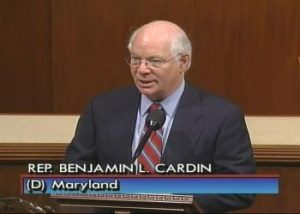
In 2006, Cardin addresses the House of Representatives calling for a withdrawal of all troops from Iraq, a war he opposed from the start. House photo
Len: In the House in 2002 you were one of the votes against the Iraq war. Was Iraq one of the biggest mistakes that the U.S. made during your career here?
Ben: Yes, yes. I’ve said this before. In my district, the 3rd District was a militant district. It had a lot of interest in supporting President Bush and going against the attack on our country on 9/11. They wanted everyone’s head. When President Bush said we have to eliminate the threat of Iraq, the popular sentiment in my district was overwhelmingly in support of the president, including Democrats.
I went up to a little room on the fourth floor in the Capitol, which is where our classified material is. I didn’t have a staff that could do that. I went up there on my own and read all the documents that were available to read. I didn’t see one bit of evidence that Iraq was involved in the attack on our country. Not one bit of evidence.
And I said to myself, I can’t vote to send American soldiers into harm’s way. They’re not responsible for the attack on our country on 9/11. Yeah, there’s bad people there. And they could do a lot of bad things. But they’re using 9/11 as a justification. That’s just wrong.
So I had no choice. I couldn’t vote for it. I voted against it. I thought I could win re-election. I thought I could get through it. But I knew it would affect my career. I knew that it may even affect my re-election, but I couldn’t do anything on that.
The end result was when the Senate seat opened in 2006, I probably would not have won the Senate seat if I had voted for the war in Iraq. So there is some justice in this world.
But it was a mistake, an absolute mistake to go into Iraq. And we didn’t finish Afghanistan because we were in Iraq. We never would have had the mess in Afghanistan if we didn’t go to Iraq. We would have completed Afghanistan. and we would not have had the division in the country.
We would have reached the end of Afghanistan within a year or two or three. Not two decades later with the mess we had. So yes, we would have finished Afghanistan one way or the other. I’m not saying we would have resolved the peace in the region, but we wouldn’t have had troops there and vulnerabilities as we saw would happen later.
And as it was, we never completed Iraq. In Iraq, the militants are still operating there. So it was a huge mistake the way we went into Iraq. We never should have done that. And as we now know — I did not know this at the time – there were no weapons of mass destruction. I thought there were weapons of mass destruction because I was told there were weapons of mass destruction there. I didn’t see any evidence, but I wasn’t looking for that. That wasn’t the reason that I thought we should not go into Iraq, because a lot of countries have weapons of mass destruction. We don’t go into all those countries.
Magnitsky sanctions
Len: What in what you’ve done in foreign policy is the most important?
Ben: I’m probably known best for the Magnitsky sanctions. It was my bill. It was my concept. It was my strategy to get them enacted into law.
These are the primary sanctions against human rights abusers, corrupt leaders. It’s being used right now in Georgia [former Soviet state on the Black Sea] in regard to the registration law. It was used in this Hokie massacre to impose sanctions on the people that were responsible there. It was used in Russia for a lot of different situations. There’s been about 700 individual cases where they’ve been used.
These sanctions prevent a person from coming to America or using our banking system. I was able to get it done even though it was opposed by the Obama administration. I was able to get it enacted and convince Europe, Canada, UK to follow suit. They now have two similar statutes. It is the most effective way to deal with corrupt leaders and oligarchs because they don’t want these sanctions imposed against them. So it is very real.
Len: You think these sanctions really work?
Ben: I can tell you they work because the first issue that [Russian president] Putin mentioned to Trump when they met was getting rid of the Magnitsky sanctions. It affected Putin’s ability to run his corrupt regime. It works. I can tell you that I’ve been around the world and know the impact. I’ve been lobbied here by lawyers trying to get off Magnitsky lists for their clients.
Len: Do these individual sanctions work better than sanctions again countries?
Ben: Russia’s paying a price. The sanctions are affecting them. Sanctions have two parts. One is a message. You’re doing something wrong and we’re going to put a spotlight on it. Secondly, it does intimidate investment because banks are reluctant to go into industries that could be sanctioned. So if we have sanctions on Russian oil, there’s a lot of investors will be very squeamish about going into any type of investment that could be involved in Russian oil. So it does have an impact.
Other foreign issues
Ben: Before you get to domestic issues, I’m proud of my leadership on the climate issues. I’ve led the COP meetings {Conference of the Parties to the UN Framework Convention on Climate Change]is an international climate summit in Paris on climate change.
I’ve been the point person to fight anti-Semitism. I have developed the Iran nuclear agreement review statute, which I think gave us the right way to review the Iran nuclear agreement, made it a better agreement, even though I opposed [the original agreement], and gave us an orderly way to consider it. We never would have gotten that. I did that when I first became ranking member of the Senate Foreign Relations Committee.
There’s a lot of areas of foreign policy I’ve been extremely engaged in. I don’t want to leave it just with human rights or with the Iraq war. There are many initiatives I’ve had in regard to foreign policy issues that I’ve worked on, but I think I’m best known as a human rights defender. I’ve been outspoken in support of human rights.
Sometimes you get people stopping and talking to you about these individual cases – a Wall Street Journal reporter that’s in prison or you see the face of Vladimir Kara-Murza. [A recently released Russian human rights advocate who cited the Magnitsky sanction in a 60 Minutes interview in September.]
Domestic issues
Ben: On the domestic side. Maryland is a great state to represent. My priorities have been in regard to the Chesapeake Bay, in regard to our transportation infrastructure, to get that updated and modernized, we’ve been able to make some real significant progress on the infrastructure bill in reconnecting communities for Baltimore, getting lead out of pipes. There are a lot of issues.
We’ve just had people in the office today on [walking and hiking] trails. I’m known for all the resources I’ve gotten into reconnecting communities through trails. They’re now there and they weren’t there when I first came to Congress.
The National Institute’s Minority Health and Health Disparities is my initiative. Pediatric dental care is my initiative. That’s now law. Comprehensive preventive health services under Medicare are my bill.
I’m very proud of what I’ve been able to get done domestically. That’s been my bread and butter. I wanted to get on the Senate Finance Committee [which deals with health care] I was on the Ways and Means Committee when I first started and in the House.
I’m now on the Finance Committee and the Environment and Public Works Committee for infrastructure and the Bay. Those committee assignments were chosen with that in mind. Pension reform is my bill — increasing opportunities for particularly lower income families to be able to save for retirement. Small business initiatives for underserved communities. That’s my initiative. Saving nonprofits during the Covid. That was my initiative. So there’s a lot of things I’ve been able to get enacted into law, and a lot of that is bipartisan, working across party lines to get things done.
Ben: This Senate is dysfunctional at times when we have round the clock voting. It happens at least once a year. And there are nights that you wonder why you’re here.
My service has been a sacrifice for my family. But I never missed a sporting event for my grandchildren if it was humanly possible. I was there. I never have spent a night in Washington since I’ve been a United States senator. I get home every night.
You make your decisions. I don’t get to as many embassy dinners. It doesn’t bother me, missing embassy dinners. I’d rather eat at home. And by the way, you can succeed as chairman of the Senate Foreign Relations Committee without attending embassy dinners.
Closing thoughts
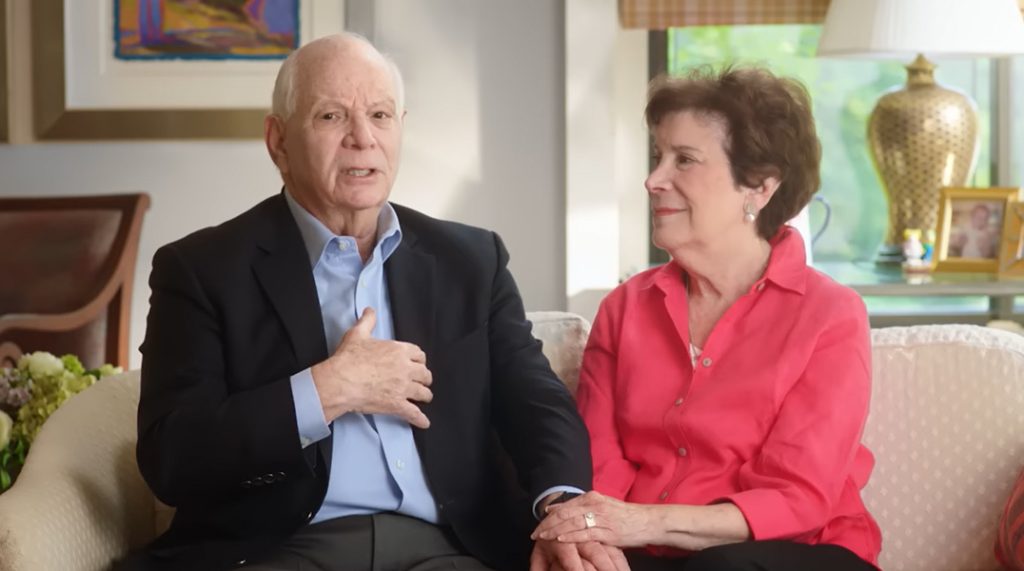
In May 2023, U.S. Sen. Ben Cardin with his wife Myrna announced that he will not seek re-election, calling to a close a career in elective office that has spanned 58 years. Screenshot from YouTube.
I think I will be able to make some tough choices about what I want to do. But I’m not going to make those decisions too quickly. I’m not looking for just a title. I want to do something that’s meaningful.
Len: Closing thoughts?
Ben: I just thank the people of Maryland. It’s been 58 years, 18 elections. There have been remarkable people I’ve worked with over the years. So I really thank the people of Maryland for giving me this opportunity.
I’ve tried to follow my father’s advice when I was first elected at age of 22 to start serving at the age 23 in the Maryland General Assembly. He told me it’s a great opportunity. Don’t waste any of your time. I try to do that. I try to take advantage of every year.
In the state legislature, it was kind of easy. Because if you really want to work hard in the General Assembly, there are lots of opportunities. And it was a rather pleasant environment in the U.S. House of Representatives. It was more challenging because of two-year terms. Everybody’s always in re-election mode and raising-money mode. So it was a little more challenging.
In the Senate, a six-year term really gives you the ability to do things. The friendships I have on both sides of the aisle are real. I know their families. I know we’re friends.
Last night, Roger Wicker, a Republican from Mississippi, introduced me for an award I got from the international lawyers, and it was just genuine. We’re friends. I mean, real friends, not just colleagues. Rob Portman [Ohio Republican]. We’re close friends.
The friendship is real in the Senate, and we work together here. The system doesn’t work together, but senators work together to get things done. And that’s why I can get things done because I have those relationships. So it’s been a real honor, and I’ve tried to take advantage of every day, including today. I try to get the bridge moving by talking to a couple of my colleagues. So every day we’re trying to do what we can.
Misses’ town hall meetings
Len And you’re not going to miss the interviews.
Ben: I’ll miss you guys. [Laughs] I’ll tell you what I will miss, what I can’t do anymore – I’ll miss town hall meetings.
Len: You can’t do them anymore?
Ben: You can do them, but it causes a lot of commotion for the local police and the local communities. They don’t mind you doing town hall meetings that are controlled audiences, but with open audiences today, ever since Gabby Giffords attack [The Arizona congresswoman shot at a supermarket] it will require a lot of police presence, and that takes away a lot from it.
So you sort of have-to-have controlled settings today. Even when I go to western Maryland, we don’t necessarily agree on a lot of the issues. It’s wonderful. I go to Western Maryland and have impromptu town hall meetings, but I can’t have the advertised town hall meetings. And I love that. I love the unscripted question-and-answer format to me. I like interviews. I like the challenge.
I don’t mind teaching in a setting where students are inquisitive and want to ask questions and don’t want to just be lectured to. I’ve taught a lot of classes and I’m. I’ve been able to get that message across.
I meet with my interns all the time and I’ve been doing this forever and I don’t lecture them, I challenge them. There are some groups that are better than others. But if you get them engaged. You’re giving them your view and then you’re letting them give you their view and then you’re challenging their view and in the end you’re giving your view. You’re getting it out in a way in which it will have much more of an impact.
Of all the things I’ve done in my elected office, these intern sessions have come back to me over and over again where 10, 15, 20 years later, I’ll meet someone who was an intern in this office and they’ll talk about that and how it got them interested in pursuing a particular field.
I want to challenge students. I don’t want to lecture to them. I don’t think they want to be lectured to anymore.
I think I will be able to make some tough choices about what I want to do. But I’m not going to make those decisions too quickly. I’m not looking for just a title. I want to do something that’s meaningful.

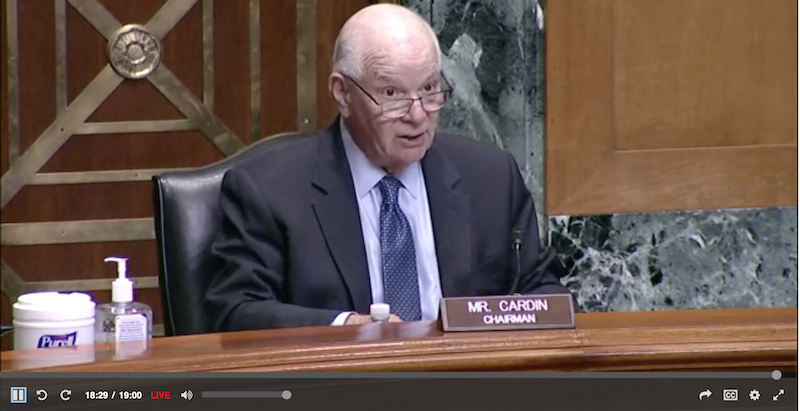

Recent Comments